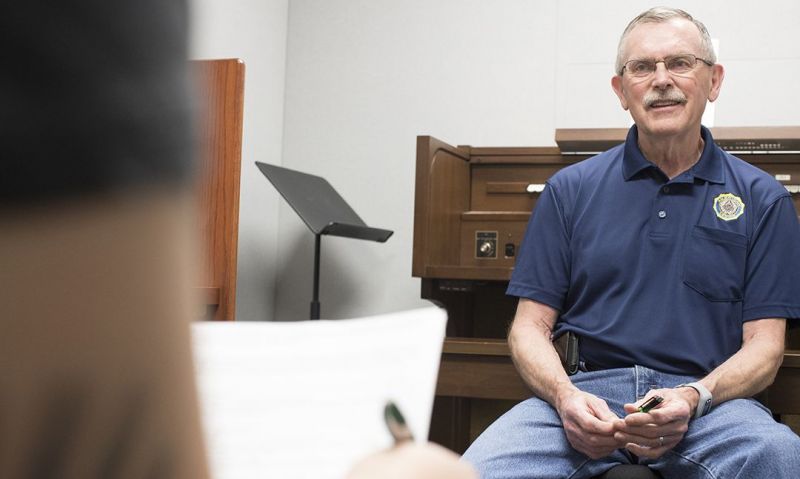
Student veterans group at Tennessee college conducts Library of Congress oral history event.
The Veterans History Project (VHP) oral history program of the Library of Congress has had support from The American Legion since its establishment in 2000; the Legion is a founding partner. And the Legion – whether by national resolution or local post involvement – also supports veterans groups on campuses across the country. All three converged when the Student Veterans Organization (SVO) at Columbia State Community College in Columbia, Tenn., set up interviews April 18-19 for area veterans to give filmed accounts of their service that will end up in the Library.
SVO president/founder David Donnelly, a fairly new Legionnaire, worked at senior homes when he was younger and paid close attention to the residents. “It was amazing to hear these stories,” he commented. Donnelly considers talking a good source of camaraderie and even healing, including for those who have served in the military; service is “a part of your life that never really leaves.” At the latest Student Veterans of America national convention, he heard Library of Congress Liaison Specialist Andrew Huber give a VHP presentation and was inspired.
SVO is in its third semester of existence, and is active in liaising between student veterans and Columbia State administration. Non-veteran students can join as affiliate members; Donnelly said it “gives students the opportunity” to help their veteran counterparts. He reached out to other campus groups for volunteers to give interviews and take notes. He also approached his Legion post, Herbert Griffin Post 19 in Columbia, to talk up the event. (Of his membership, he commented, “The connections I’ve made there have been invaluable.”)
More than 25 subjects – veterans and Gold Star family members – signed up for half-hour-plus interview slots in soundproof practice rooms in Columbia State’s performing arts building, where they answered questions from interviewers while a video camera ran and another volunteer took notes that will provide metadata researchers can look for among all the archived VHP histories. After their interview, each subject received a copy of the video on a thumb drive. The American Legion was represented by Centennial-themed history displays brought from National Headquarters in Indianapolis.
Columbia State president Dr. Janet Smith, visiting the green room between meetings, lauded the student-driven nature of the event – “That’s one of the best whys I can think of” – and how its educational and historical focus dovetailed with the mission of the college.
One interview slot was filled by Post 19 Commander Darrell Van Dusen, who discussed his reaction to seeing Korea and Japan for the first time, as well as the use of Agent Orange in Korea. He has a historically minded daughter and grandchild, so he commented that “I feel good” about his interview entering the Library of Congress archive.
Kim Smith, who serves as Post 19’s hall manager, also attended based on Donnelly’s appearance; he decided “it’d be good to do.” Sitting in the green room after his interview, Smith was already thinking of more stories he could have told. He commented that sharing memories will help the next generation.
Lexine Davis came to the event to tell the story of her late husband, John Allan Davis. He was injured three times during his military career, the last during the Tet Offensive; she believes he was a Legionnaire. Although the two did not marry until after his service, she said, “I watched how he suffered” from the aftereffects of his injuries – particularly PTSD. Davis gave her husband’s history in order to encourage future searchers of the VHP archives to take the issues of mental health and PTSD “more seriously.” She would especially like to see more guidance and warning signs given to caregivers, so they can help their loved ones.
Dr. Ginny Massey-Holt is an associate professor of nursing and SVO’s adviser – a veteran herself. She admitted that before the event started, “I didn’t know what to expect.” But she stressed that using the Library’s outlines, a VHP event is not as complicated as potential organizers and interviewees might think.
Andrew Huber of the Library of Congress – who Donnelly heard at the SVA convention – was on hand at the event, and praised the prep work the SVO/Columbia State team did. He also had praise for The American Legion, commenting that Legion elements are often the first to sign up or show up for a VHP event: “We really appreciate all the Legion does for us.” When the VHP was founded, the emphasis was solely on the oral history, but since then it has expanded to take sets of physical material within certain parameters; a few interview subjects brought in photographs, newspaper articles and more.
Volunteer interviewer Angel Cervera is a member of the Phi Theta Kappa honor society, one of the groups SVO reached out to, and helped both days. She was “really honored to hear the experiences … what they endured.” She was struck by the different lives and experiences different people had.
That was the kind of reaction Donnelly was hoping for – to “awaken” something in the interviewers. Of course, the event tended to awaken something in the subjects as well. And to that end, Donnelly was planning to sit for an interview himself.
For more information about the Veterans History Project, visit www.loc.gov/vets.
- Library & Museum

